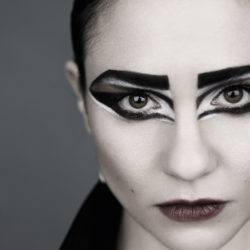Vikings star Katheryn Winnick is ready for her next conquest
TALENT KATHERYN WINNICK CREATIVE DIRECTOR ELLA MCNANEY ART DIRECTOR ERICA CORNWALL 1ST ASSISTANT CATHERINE FORSYTH PHOTOGRAPHER FREDERIC AUERBACH DIGITAL TECH HARIS SARRANTIS FASHION STYLIST NICOLAS BRU FASHION STYLIST ASSISTANT SHARON CHITRIT HAIR STYLIST DIMITRIS GIANNETOS MAKE-UP ARTIST MIRIAM AZOULAY AT OPUS BEAUTY PRODUCTION VENI MAGAZINE LOCATION H CLUB LA INTERVIEW BY CHRISTIAN CHENSVOLD





Vikings are some of history’s greatest explorers, tough and resourceful. It shouldn’t come as a surprise then that Katheryn Winnick was cast as Lagertha, the female lead in History Channel’s hit show Vikings, which is in its sixth and final season. Winnick is not only proficient in martial arts, she has an intrepid spirit of exploration that has led her from the one standing in front of the camera, to the one behind it. Veni caught up with the actress as she prepares to sail into fresh and exciting waters and see what she finds there.
VM: What’s it been like being on a hit show like Vikings?
KW: It’s been a whirlwind. I think I’m the last remaining original cast member. It’s been exciting and heartbreaking, the evolution of the show and your castmates come and go. But I’m very proud of it, and it’s a very loyal fan base.
VM: What are the fans like?
KW: Absolutely incredible. They get tattoos of mine and other characters’ faces on their bodies on a weekly basis. It’s unbelievable how many people put a tattoo of your face on their body! But they really identify with these characters, and that’s been great.
VM: What do you think accounts for the fascination with the Viking era?
KW: I think there was the sense that they were barbarians who just raped and pillaged, but that’s not the case. The show has shown the true side of how they actually lived. There’s a little bit of Viking in all of us, because they had such an impact with their migration. I have a Ukrainian background, with blond hair and blue eyes, and we were always told that Vikings invaded Ukraine. There’s a fascination to it, and more important than anything else, it was a society that really celebrated strong women. Women were allowed to not only rule and be the matriarch of a family, but also were warriors called shieldmaidens, and they fought in battle alongside their husbands and brothers. People now are seeing how unique that was.
VM: How did the experience of telling Lagertha’s story help you grow as a person?
KW: Spending my thirties on the show was an incredible learning curve for me as a person. I spent a lot of time behind the camera shadowing the directors, and in the final season I got the chance to direct a show, which I’m extremely proud of. To be able to work with my castmates and really push and challenge them creatively to dig deeper, more so than another director who just came on board to tell one episode. They were friends, but I felt I could let them not get away with things I felt were not authentic, and I was pleasantly surprised at the performances I got. So that will be my official directorial debut! I also was able to direct episode seven for a new show I have coming out on Netflix called Wu Assassins.
VM: You’ve had a steady career, but it seems like Vikings really brought you into the public consciousness.
KW: My career has been lucky in that I’ve never had a shortage of work. At the beginning you take whatever you can and try to learn your craft and how to take risks as an artist. Even though I’ve been working all these years, I was preparing for that break. No one could say I’ve had it easy. I’ve paid my dues, done a lot of crappy horror movies I’m not necessarily proud of. But it wasn’t until I developed a strong confidence in myself that it’s not going to go away, that I can choose roles and take my work more seriously. The success of the show has brought a lot more opportunities my way. Now it’s about being more selective and trying to figure out what is the best move for me creatively.
VM: What is the nature of the confidence you had to achieve?
KW: I knew no one in the business and started teaching actors martial arts. I had to go through the cattle-call casting and be one of hundreds and wonder how to stand out in a room of 40 girls auditioning for the same role. It wasn’t until I started believing in myself as an artist that it really shifted my focus. I ended up firing my team and realized it doesn’t have to be just a job, it can be a career, and that I can choose the roles that I can really shine in. That’s been the past decade, and I’m excited for what can come now.
VM: What would you like to do now?
KW: I’ve signed on for a couple of movies that have made me excited to feel like I can’t wait to get out of bed every day. That’s what drives me. I also have a passion, with the #TimesUp movement, to launch a business teaching self-defense for women. On Vikings I taught all the women, and I think it’s important now more than ever to be able to give women the tools they need to defend themselves.
VM: You mentioned your blonde hair and blue eyes. Does Hollywood still typecast blonde women?
KW: Funny, when I first started in the industry, I was told to dye my hair darker if I wanted to be taken seriously. I’ve been lucky to play several roles with a dark wig, so I’ve seen how they treat you differently. Blondes get a different set of reactions from cast and crew members. I think it’s changing; the idea that blonde hair means you’re not intelligent is such bullshit. I did a movie a few years ago where I wore a dark wig every time I showed up on set, and on the last day I took it off and nobody recognized me. And I’d spent two months with these people.
I just came back from India and traveled to some really remote locations, and the locals looked at me like I was an alien. The reaction was so striking as to how rare blonde hair and blue eyes are.
VM: Tell us more about India.
KW: It was incredible. The culture, music, food, and seeing how women are in these different areas, with arranged marriages, which are still very common and it’s rare to find a love match. The lack of opportunity women have in these small towns was definitely eye-opening. I think travel makes you become not only a better actor but a more well-rounded individual, so any chance I get to travel I usually do.
I have friends who are Indian, so I was able to get the local’s perspective rather than the five-star treatment. I ended up visiting the slums, which was really interesting. It’s a very functional, sustaining city-within-a-city. They have their own recycling system, and it was incredible how they work together as a community to raise children. Sometimes there are 12 people in one room. It was culture shock, but I loved every minute of it.



